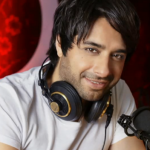This hour has George Stroumboulopoulos
CBC gambles that a MuchMusic VJ can deliver a younger audience to its current affairs programming
“Do you hear that?” asks George Stroumboulopoulos, catching everyone’s attention on set. “The groove here is ridiculous.” It’s only minutes to airtime for CBC Newsworld’s new current affairs program, The Hour, and the 32-year-old host is grooving to The Jimi Hendrix Experience’s 37-year-old “Voodoo Child.” He taps his feet, snaps his fingers, and even breaks out into a robot dance.
“I’m not really the CBC type,” Stroumbo admits. (His friends and colleagues often refer to him as Stroumbo, or George S., or even Georgie.) But when three executives approached him last fall with the opportunity to create his own news show, the former MuchMusic VJ couldn’t resist. “I remember doing a story about Britney’s gum for sale on eBay,” he says, “and I started to lose my mind.” After a five-year stint with CHUM Television, he was ready for the change.
“George is like a shark,” says Alan Cross, program director at 102.1 The Edge, who worked with Stroumbo in the late 1990s. “He wants to keep moving forward.”
While some say The Hour is a step in the right direction, critics argue that Stroumbo is a kid doing a grown-up’s job. “It’s to be expected that the CBC would continually try to rejuvenate the talent,” says John Doyle, television critic for The Globe and Mail. “But part of the problem is that when The Hour does what it does in that fast and flippant manner, it’s a disservice to CBC’s journalism.”
Although Stroumbo swears he won’t change his personality, some think that’s just what the show needs.
In 1997, when producers at The Edge didn’t have a job for Stroumbo, they created a position overnight in order to hire him. The young announcer – who then wore his hair in a long ponytail – quickly made a name for himself at Toronto’s “New Rock” format station. He was as passionate about news as he was music. “I learned about apartheid because of Bruce Springsteen’s guitarist,” he says. “I learned about race wars in England and police brutality because of The Clash. If you want to learn about Vietnam, you listen to Dylan. To me, music helps contextualize news.”
One day, Stroumbo poked fun at a band on the air, and thought he would get fired for it. “I was always wondering when my boss would say, ‘You can’t do that,'” he recalls. “But I did it anyway.”
Instead of getting the boot, Stroumbo was given a promotion to host a show called Live in Toronto. “One of the things about George is that when you listen to him, you realize he isn’t an ordinary announcer,” says Cross. “He has a very casual style about him that makes him really stand out from everybody else.” Within a few days, Stroumbo replaced the previous host, who had been there for nearly 20 years. “I remember leaving the office saying, ‘It’s on now,'” Stroumbo says. And it was.
In 2000, producers at MuchMusic hired him to do exactly what he was doing at The Edge: be himself. “The fact is, MuchMusic isn’t afraid of hiring people who know Darfur from Danang,” says Alex Strachan, national television critic for CanWest News Service, “or who, when asked to name a Canadian hero, come up with somebody as funky but seemingly unhip as Tommy Douglas.”
The New Music – which Stroumbo refers to as the Cadillac of music shows – had an opening, and he snatched it. “What I brought to that show was what the show had running through it,” he says. “I hopefully carried on the tradition of not taking the easy way out, giving a fuckin’ shit about what you’re talking about, and really loving this.”
Now at CBC, he still loves his work. Sitting in a swivel chair in the boardroom with his writers and producers, Stroumbo anxiously discusses the main story for tonight’s show, and he can’t sit still. He crosses and uncrosses his legs, peels the sticker off his Snapple Iced Tea bottle, cups his chin in his hand, and nods cheerfully at everyone’s comments. When he comes up with an idea, he pops out of his chair and grins with excitement.
“Here’s the deal with Stroumboulopoulos,” says Strachan. “He’s articulate, he’s energetic, he isn’t afraid of challenging people in on-air interviews, and he doesn’t suck up. He seems confident without being arrogant, and that’s a rare combination. I actually believe, if anything, he may be underrated.”
After the meeting, Stroumbo sits at his cubicle and sifts through his mail. He opens a letter from ideaCity, an annual Canadian conference that brings together influential personalities to brainstorm ideas for changing the world. Stroumbo has been invited as a guest speaker and as he ponders the idea, his publicist approaches and tells him he needs to head to another meeting. Stroumbo flicks the letter onto his desk, next to his half-eaten lunch and pile of unopened mail, and rushes off.
Two hours later, in the makeup room, he recites his lines while spewing his own thoughts on the news to anyone around him who will listen. He then rubs a greasy lump of Murray’s wax through his hair, attaches a microphone to his shirt, and looks at himself in the mirror. Wearing his classic outfit – black shirt, low-rise Diesel jeans, silver-studded belt, and bright Adidas shoes – Stroumbo smiles and heads to the set.
The Hour, which premiered in January, takes a look at the day’s news through small bits and segments. Strachan believes it is an incredibly ambitious, but admirable effort made by the CBC to stay fresh and relevant. “For all the whinging and whining I’ve heard about The Hour from older people – my father, for example, in his 80s, just cannot abide by it, either the show itself or its host – it’s achieving what it’s trying to do, which is to put a youthful, irreverent spin on the news, but without the snide condescension of The Daily Show.”
Jennifer Dettman, executive producer, helped create the show’s concept by targeting audiences with Stroumbo’s youthful personality. “I suppose that’s cool,” says Stroumbo, “because for the longest time, getting people under the age of 15 engaged on a Newsworld program was rare.” Doyle, on the other hand, argues that no program on television should be so outlandish and different that it alienates a portion of the viewers by age group. But Stroumbo denies that the show is doing that. “People say the show is aimed at getting younger viewers,” he says. “But if it were, why would I interview a holocaust survivor?”
With minutes to go until the show goes live, the producers stand around the set, looking relaxed, laughing every now and then at Stroumbo’s jokes. “George is more like a kid who is trying to do it, but doesn’t have the experience or depth of knowledge to get it right,” says Doyle. On-air and in person, he uses words like “cool” and “dude” all the time. “It’s irritating to watch,” Doyle explains. “And it gives the impression that George doesn’t have much of a vocabulary.”
But he does have a loyal audience. According to Joe Andrews, his former instructor at Humber College’s radio broadcasting program, Stroumbo is personable, genuine, and always a gentleman. “He certainly speaks for a lot of people across the country,” Andrews says. “He has a huge following because of his MuchMusic persona.”
Stroumbo says he wants to stay true to his character. “A lot of people thought the CBC would take me and change me,” he begins. “But I wouldn’t do that. When you make a decision to hire me, it means there are some things the show’s not going to be. It’s not going to be the same old, same old. That’s just not my personality.” But for those who have followed Stroumbo since he started in the business nearly a decade ago, it seems wherever he goes, he in effect gives the same old, same old. “He’s too much of a fan to lose his music personality,” says Cross. “It will always be there in some form.”
Still, Andrews believes the show is on the cutting edge. He calls The Hour a form of reflective journalism. “It’s a way of targeting your information to the audience that you’re serving accurately,” he explains. It’s what gets people talking about important issues.
“We really look to make sure that we cover everything that’s happening in the world,” Stroumbo says. “For every one hour, we want to hit a range of emotions.” But Doyle thinks the show is trying to do too much. “The problem arises when the light and breezy style of journalism is used to tackle subjects that are serious, and require a more concentrated and thorough examination,” he says. “For example, the situation in Northern Ireland was explained in 60 seconds and there were several things wrong.” Although Stroumbo admits the show is still developing, he is proud of its diverse nature. “I love the idea that we continually move it forward,” he says. “I don’t want to ever narrow the focus.”
Between segments, one of the show’s guests is worried about how he sounded on-air. Stroumbo assures him the interview went well: “As long as you speak like a human being, I’m happy,” he says. “Thanks for being on the show, dude.”
At times, Stroumbo says, this is real journalism. But his music personality will always be a part of the show. And for now, it’s working. “My honest feeling at this stage is that CBC probably needs Stroumboulopoulos more than Stroumboulopoulos needs the CBC,” notes Strachan. “Could the clock be ticking on the burnout factor? We’ll just have to wait and see.”
In the meantime, Stroumbo sticks to advice he learned early in his career from Canadian radio guru Bob Mackowycz: Never talk down to your audience, and fuck ’em if they don’t get it.










